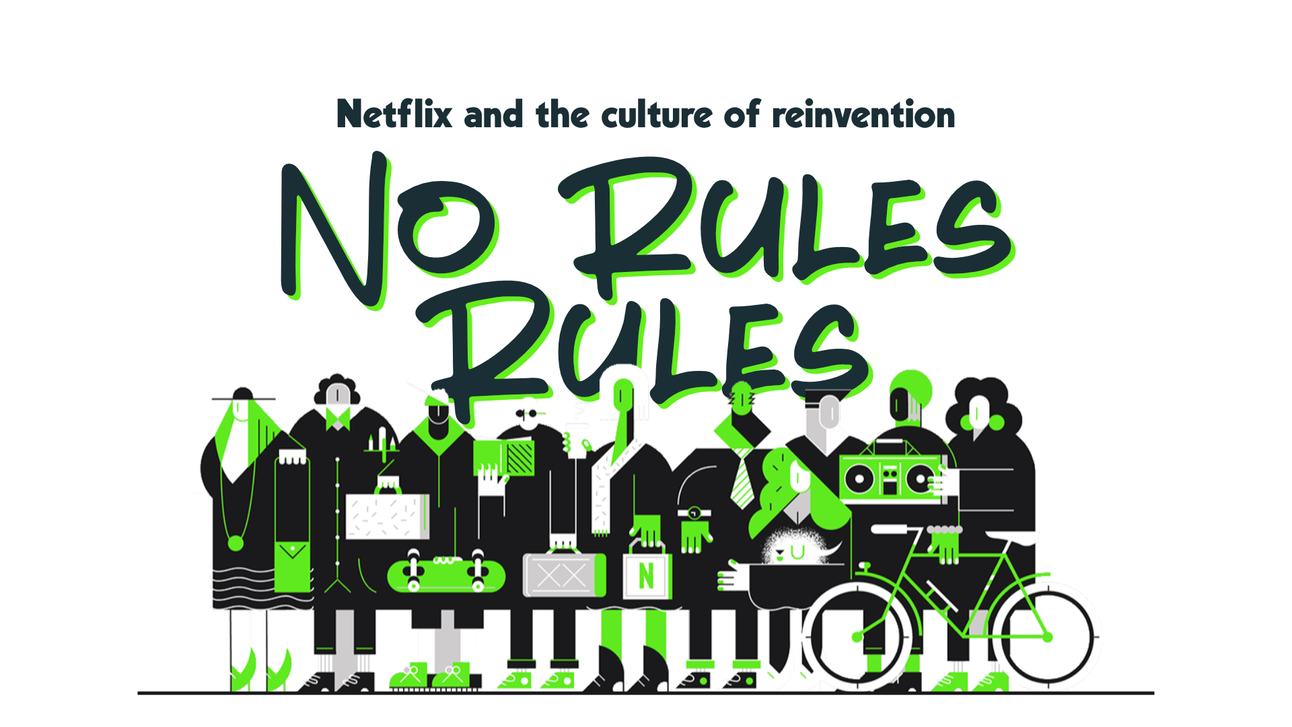
The only book that you need to read about company culture

The only book that you need to read about company culture
No Rules Rules: Book Analysis



Netflix is one of those companies that most people dream of working for. And the main reason for it being the company culture. And this book exactly elaborates on the principles and philosophies on top of which it was formed.
If you want to read just one book about the company culture, then this is it.
In "No Rules Rules," Reed Hastings and Erin Meyer talk about the unconventional culture that propelled Netflix to the forefront of the entertainment industry.
They throw out the traditional management playbook, advocating for a radical approach built on three pillars: attracting and retaining top talent, fostering open and honest communication, and empowering employees with freedom and accountability.

The Power of A-Players: Cultivating a Culture of Excellence
Hastings prioritizes hiring and retaining "stunning" talent, believing that surrounding yourself with high performers creates an environment that pushes everyone to excel.
Imagine a sports team where every player is a star -- their dedication and skill rub off on each other, elevating the entire team's performance. This philosophy translates to the workplace: A-players raise the bar for everyone, leading to better decision-making, higher quality work, and a constant drive for innovation.
Netflix achieves this through competitive salaries and benefits, a streamlined hiring process focused on cultural fit, and a focus on long-term potential. However, this approach isn't without risks.
A rigorous selection process is crucial to avoid bad hires, and the system requires a certain tolerance for occasional misses. Letting go of under-performers quickly becomes even more important, as a single weak link can break the entire chain.

Radical Candor: The Art of Giving and Receiving Honest Feedback
These champions are open and communicate honestly, even when delivering critical feedback. This "radical candor" fosters continuous improvement and prevents blind spots. Imagine receiving constructive criticism from a colleague who genuinely cares about your success; it can be a powerful learning experience.
The importance of context and delivery to ensure feedback is helpful, not hurtful. A good leader sets the tone and demonstrates how to receive it constructively. This creates a safe space for open dialogue where everyone feels comfortable sharing their perspectives, leading to better decision-making and a more engaged workforce.
However, radical candor can be a double-edged sword. If not handled carefully, it can create a culture of fear or negativity. Leaders need to establish clear guidelines and expectations around feedback delivery, ensuring it's specific, actionable, and delivered with respect.
Additionally, some personalities will struggle with receiving criticism, so fostering a culture of psychological safety becomes an issue.

Context, Not Control: Empowering Employees for Agility
Netflix minimizes rules and approvals, trusting employees to make decisions within a well-defined company context. This empowers individuals to take ownership of their work and fosters innovation.
Imagine a team of chefs who are given the freedom to experiment with ingredients and recipes within the overall framework of a specific cuisine. This freedom allows for creativity and the development of new and exciting dishes.
The system relies on employees acting in the company's best interests, and a strong company culture serves as the guiding principle. However, this approach requires a certain level of maturity and accountability from employees.
Without a strong foundation of shared values and goals, chaos can ensue. So make sure of it.

Context-Free Freedom: Treating Employees Like Adults
Treating employees as responsible adults, not children who need constant supervision, leads to increased motivation and satisfaction.
Imagine a workplace where you're not bogged down by endless approvals or micromanagement. You have the freedom to manage your time, resources, and workload within the broader company goals.
This creates a sense of autonomy and ownership, allowing employees to be more creative and productive.
Leaders need to demonstrate trust by giving employees the benefit of the doubt and avoiding micromanagement. This trust can be built through open communication, clear expectations, and a track record of supporting employees' decisions. A strong company culture acts as a guiding force, providing a shared understanding of values, goals, and acceptable behavior.
When employees understand the "why" behind their work, they can make responsible decisions even in the absence of strict rules. Transparency around company goals, resources, and performance expectations ensures employees are making informed decisions.

Adequacy Breeds Adequacy: The High Bar Advantage
Hastings suggests a "keeper test" -- you ask yourself if you'd fight to retain an employee if offered a chance to work elsewhere. This philosophy ensures a team consistently exceeding expectations, pushing each other to be better.
Maintaining a high bar requires a multi-front approach. A robust performance management system is essential. Such a system provides ongoing feedback, identifies areas for improvement, and helps employees reach their full potential.
Fostering a culture of continuous learning and development is crucial. By providing opportunities for employees to acquire new skills and knowledge, they are empowered to stay ahead of the curve and contribute to raising the bar.
Lastly, leaders need to be comfortable having difficult conversations with under-performers. While offering coaching and support is crucial, sometimes letting go of those who consistently fall short is necessary to maintain the high standard of performance.

Pay Top Dollar, Get Top Talent
Hastings challenges the traditional notion of paying based on industry standards, advocating for offering top dollar to secure the best people. Imagine having access to the most talented individuals in your field; the potential for innovation and success is significantly higher.
Offering competitive compensation packages provides a talent acquisition advantage. This makes your company a more attractive option for top performers, thereby giving you a wider pool of talent to choose from during recruitment.
Competitive compensation contributes to retention and motivation. When employees feel valued and well-compensated, it increases their satisfaction and motivation, ultimately leading to a more engaged workforce.
Focusing on hiring top talent and investing in competitive compensation may seem like a significant initial investment. However, it often leads to increased productivity, innovation, and ultimately, higher profits as top talent tends to bring unique skills, ideas, and perspectives to the table, driving value creation within the organization.
They all want to play the game, money is just a way of keeping score.

Values Over Process: Culture as the Guiding Force
Netflix's culture, built on honesty, responsibility, and freedom, guides employee behavior. A workplace where everyone is aligned on core values -- there's less need for complicated rule books and bureaucratic processes.
Employees are empowered to make decisions based on these shared values, leading to faster decision-making and greater agility.
Leaders need to actively embody the company's values in their behavior and decision-making. Inconsistency between espoused values and actions erodes trust and weakens the culture.
Attracting individuals who resonate with the company's values ensures a more cohesive and harmonious work environment. Hiring for cultural fit is crucial to sustain the desired culture over time.
Continuous reinforcement is essential. Company culture doesn't magically stay strong -- it needs to be continuously reinforced through training, recognition programs, and open communication.

A few of these pointers may or may not work for your company. Once again, that's the whole point. A company culture will change based on your countries culture, and you must be okay with it.
And if you run a company in India, probably the cultures of people will change between every street. 😂
Soak all these in and make something that works best for you.
7 Key Takeaways from the book:
- Talent is Paramount: Invest in building a team of high performers.
- Honest Feedback Fuels Growth: Embrace "radical candor" for continuous improvement.
- Trust Breeds Innovation: Empower employees with freedom and accountability.
- Treat People Like Adults: Minimize bureaucracy and micromanagement.
- Set the Bar High: Don't settle for mediocrity, constantly push for excellence.
- Invest in Your People: Competitive compensation attracts and retains top talent.
- Culture is King: A strong company culture can replace a multitude of rules.
11, PNR Nagar
Dindigul, Tamil Nadu 624001, India
No comments yet. Be the first to comment!